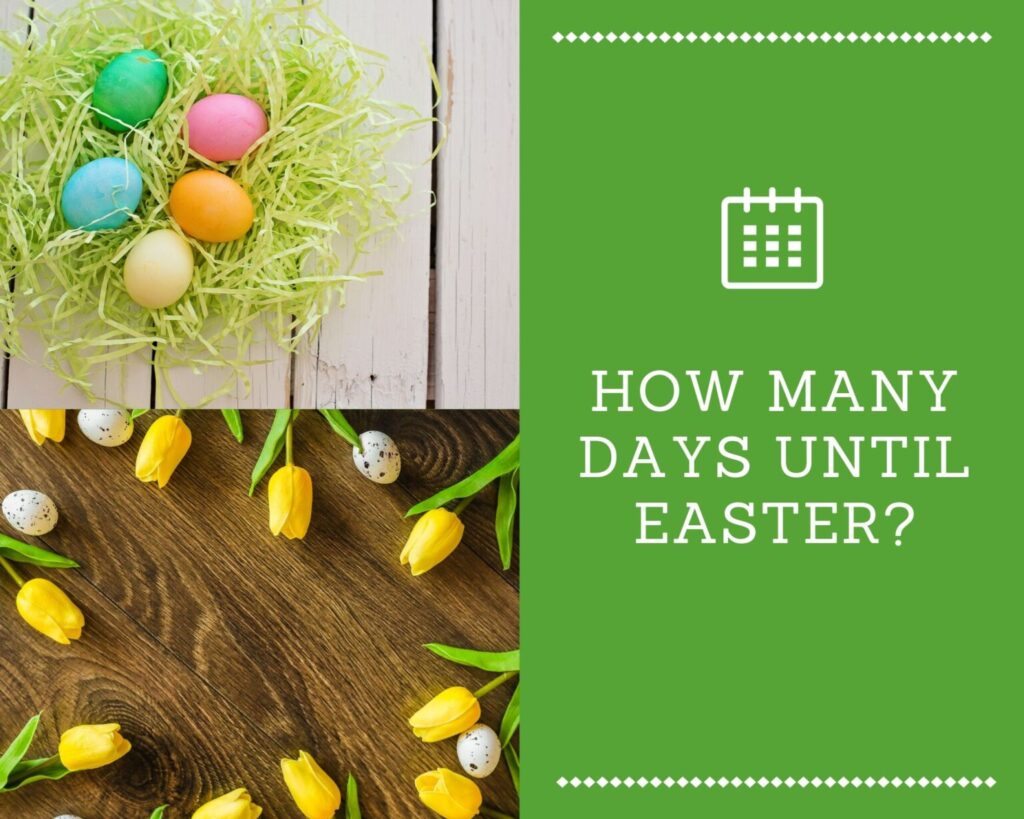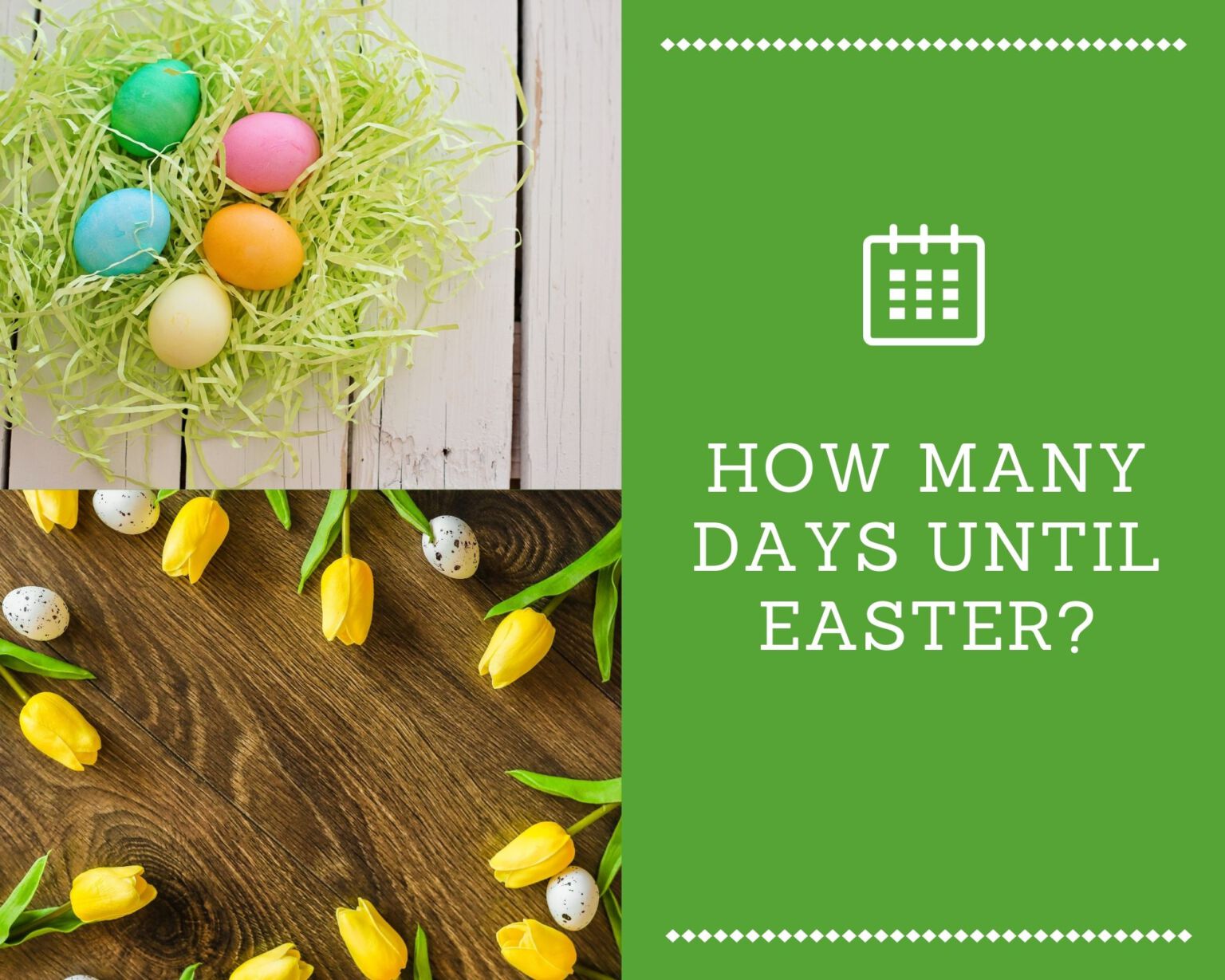
How Many Days Till Easter 2025 If It Is 12 of April? Your Ultimate Guide
Are you eagerly anticipating Easter 2025 and wondering exactly how much longer you have to wait if today is April 12th? You’re not alone! Many people find themselves needing to calculate the time remaining until this significant Christian holiday. This comprehensive guide will not only provide you with the precise answer but also delve into the fascinating history of Easter, its calculation, and related traditions. We aim to be the most authoritative and helpful resource on this topic, providing you with a wealth of information and a user-friendly experience.
In this article, we’ll not only tell you how many days are left until Easter 2025 from April 12th but also explore the intricacies of the Easter date calculation, the significance of the holiday, and answer frequently asked questions. You’ll gain a deep understanding of Easter, its cultural importance, and why it’s celebrated when it is. Get ready for a comprehensive journey into the world of Easter!
Calculating the Days: How Many Days Until Easter 2025 from April 12th?
Let’s get straight to the point. Easter Sunday in 2025 falls on April 20th. Therefore, if it’s April 12th, there are exactly 8 days until Easter Sunday.
This simple calculation is the starting point, but understanding *why* Easter falls on April 20th requires a deeper dive into the history and mechanics of the Easter date calculation.
The Intricacies of the Easter Date Calculation
The date of Easter is not fixed like Christmas; it’s a movable feast, meaning it falls on a different date each year. This is because Easter is linked to the lunar cycle and the Jewish festival of Passover. The formula for determining the Easter date is quite complex, but here’s a simplified explanation:
* **The Council of Nicaea (325 AD):** This council established that Easter should be celebrated on the first Sunday after the first full moon following the spring equinox (also known as the vernal equinox) in the Northern Hemisphere. The spring equinox is usually on March 20th or 21st.
* **The Lunar Cycle:** The full moon used for calculating Easter is not the astronomical full moon but a calculated full moon based on the Metonic cycle, a period of approximately 19 years after which the phases of the moon recur on the same days of the year. This is crucial because the Church needed a consistent, predictable system for determining the date.
* **Gregorian Calendar:** Most Western churches use the Gregorian calendar, which defines the spring equinox as March 21st. Eastern Orthodox churches typically use the Julian calendar, which is currently 13 days behind the Gregorian calendar, leading to different Easter dates.
This complex method is why Easter can fall anywhere between March 22nd and April 25th. Understanding this background illuminates the historical and astronomical significance of the Easter date.
Why is Easter a Movable Feast?
The decision to link Easter to the lunar cycle and the spring equinox reflects the early Church’s desire to connect the Christian celebration of Christ’s resurrection with the Jewish Passover. The Last Supper, which occurred before Jesus’ crucifixion, was a Passover meal. By aligning Easter with Passover, the early Church emphasized the continuity between the Old and New Testaments.
A Historical Journey: The Evolution of Easter Traditions
Easter is one of the most important festivals in the Christian calendar, celebrating the resurrection of Jesus Christ from the dead, described in the New Testament as having occurred on the third day after his burial following his crucifixion by the Romans at Calvary c. 30 AD. The religious significance is immense, representing hope, renewal, and the victory of good over evil.
However, Easter traditions extend beyond the religious sphere, incorporating many cultural and secular customs. These customs have evolved over centuries and vary significantly across different regions and countries.
* **Easter Eggs:** The egg is an ancient symbol of new life and rebirth. Decorating eggs is a tradition that predates Christianity, but Christians adopted the egg as a symbol of Jesus’ resurrection. The cracking of the egg symbolizes Jesus emerging from the tomb.
* **Easter Bunny:** The Easter Bunny is a more recent addition to Easter traditions, originating in Germany in the 17th century. The bunny symbolizes fertility and new life, and it’s believed to bring Easter eggs to children.
* **Easter Parades:** Easter parades are a popular tradition in many countries, particularly in the United States. These parades often feature elaborate costumes, floats, and music, celebrating the arrival of spring and the joy of Easter.
* **Easter Feasts:** Easter Sunday is often celebrated with a special meal, typically featuring ham, lamb, or other festive dishes. These feasts symbolize abundance and celebration.
Easter in 2025: What to Expect
Easter 2025, falling on April 20th, will likely see a continuation of these cherished traditions. Churches will hold special services, families will gather for feasts, and children will eagerly hunt for Easter eggs. Retailers will offer Easter-themed products, and communities will organize Easter events.
Moreover, Easter 2025 provides an opportunity to reflect on the deeper meaning of the holiday – the themes of hope, renewal, and resurrection. It’s a time for spiritual reflection and for celebrating the bonds of family and community.
LSI Keywords and Related Concepts: Expanding Your Easter Knowledge
To further enrich your understanding of Easter and its related concepts, here are some LSI keywords and related terms:
* Easter Sunday 2025
* When is Easter in 2025?
* Easter date calculation
* Vernal equinox
* Lunar cycle
* Passover
* Easter traditions
* Easter eggs
* Easter bunny
* Easter parades
* Easter feasts
* Christian holidays
* Religious festivals
* Spring equinox date
* Gregorian calendar
* Julian calendar
* Easter Orthodox date
* Metonic cycle
The Significance of Easter: More Than Just a Holiday
Easter’s significance extends far beyond a simple holiday. It’s a cornerstone of Christian faith, representing the triumph of life over death and the promise of eternal life. The resurrection of Jesus Christ is the central tenet of Christianity, and Easter celebrates this pivotal event.
Furthermore, Easter is a time for reflection, repentance, and renewal. Many Christians use the Lenten season leading up to Easter as a time for fasting, prayer, and self-examination. Easter Sunday marks the end of Lent and the beginning of a new chapter.
Easter and the Economy: A Boost for Retail and Tourism
Easter also has a significant impact on the economy. Retailers see a surge in sales of Easter-themed products, such as candy, decorations, and clothing. Tourism also benefits, as people travel to visit family and attend Easter events.
According to recent market analysis, Easter spending continues to grow annually, driven by consumer demand for traditional Easter products and experiences. This economic impact underscores the holiday’s widespread cultural significance.
Easter Around the World: Diverse Celebrations
Easter is celebrated in diverse ways around the world, reflecting different cultural and religious traditions. In some countries, Easter is a predominantly religious holiday, while in others, it’s more of a secular celebration.
* **Europe:** Many European countries have unique Easter traditions, such as egg-rolling competitions in England and water fights in Poland.
* **Latin America:** Easter is a major religious holiday in Latin America, often celebrated with processions, religious dramas, and special meals.
* **United States:** The United States blends religious and secular Easter traditions, with church services, Easter egg hunts, and family gatherings being common.
Expert Insights: Understanding Easter from a Theological Perspective
From a theological perspective, Easter is the most important event in the Christian calendar. It signifies the fulfillment of God’s promise to redeem humanity through Jesus Christ. The resurrection of Jesus is seen as proof of his divinity and the promise of eternal life for believers.
Leading theologians emphasize the importance of understanding Easter within the broader context of Christian doctrine, including the concepts of sin, atonement, and grace. Easter is not just a historical event but a transformative experience that can change lives.
Q&A: Your Burning Easter Questions Answered
Here are some frequently asked questions about Easter, answered with expert insights:
1. **Why does the date of Easter change every year?**
*Easter’s date is determined by the lunar cycle and the spring equinox, as established by the Council of Nicaea in 325 AD.*
2. **What is the significance of Easter eggs?**
*Eggs symbolize new life and rebirth, representing Jesus’ resurrection from the tomb.*
3. **Where did the Easter Bunny tradition come from?**
*The Easter Bunny originated in Germany and symbolizes fertility and new life.*
4. **How do Eastern Orthodox churches calculate the date of Easter?**
*Eastern Orthodox churches typically use the Julian calendar, which differs from the Gregorian calendar used by Western churches.*
5. **What is the Lenten season?**
*Lent is a 40-day period of fasting, prayer, and self-examination leading up to Easter.*
6. **What are some common Easter traditions around the world?**
*Common traditions include egg hunts, Easter parades, special meals, and religious services.*
7. **What is the theological significance of Easter?**
*Easter celebrates the resurrection of Jesus Christ, the central tenet of Christian faith.*
8. **How does Easter impact the economy?**
*Easter boosts retail sales of Easter-themed products and contributes to tourism.*
9. **What is the relationship between Easter and Passover?**
*Easter is linked to Passover, as the Last Supper was a Passover meal.*
10. **How can I make Easter more meaningful for my family?**
*Participate in religious services, engage in acts of service, and reflect on the deeper meaning of the holiday.*
Conclusion: Embracing the Spirit of Easter 2025
As we’ve explored, calculating how many days till Easter 2025 from April 12th is just the beginning of a fascinating journey. Easter is a complex and multifaceted holiday with deep religious, cultural, and historical significance. Understanding its origins, traditions, and theological meaning enriches our appreciation of this important festival.
We hope this comprehensive guide has provided you with valuable insights and answered your questions about Easter. Whether you’re a devout Christian, a curious observer, or simply someone who enjoys the traditions of the holiday, Easter offers something for everyone.
Now that you know how many days are left until Easter 2025, consider exploring some of the traditions mentioned in this article. Perhaps you’ll decorate Easter eggs, attend a church service, or simply spend time with loved ones. Share your favorite Easter traditions in the comments below!

